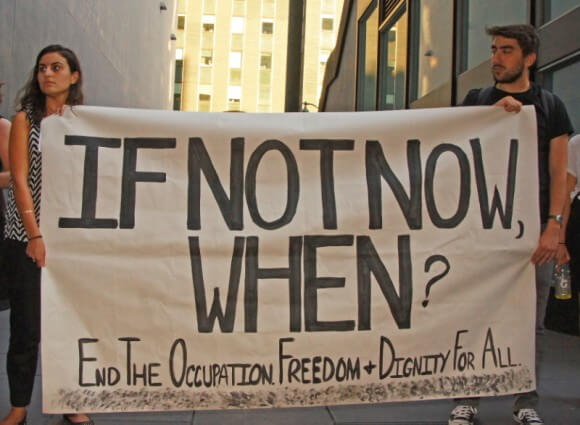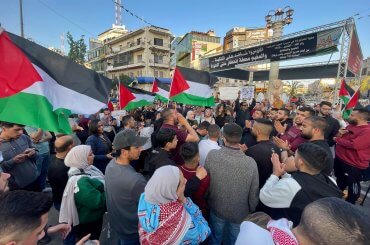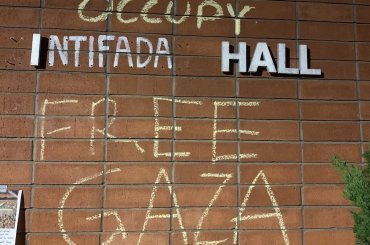When Israeli bombs blanketed Gaza in July, the liberal Zionist lobby J Street largely fell in line with the Jewish establishment. “Our public record throughout the current military confrontation in Gaza has been unambiguous: we support Israel’s right to defend its citizens,” J Street said in a statement.
At the same time that J Street was proving its pro-Israel credentials, former and current members of the organization, most of them affiliated with its campus arm, were throwing themselves into a starkly different kind of activism–one that forthrightly criticized the attack on Gaza and the Jewish establishment that supported the military action. The group they formed, If Not Now, has taken aim at mainstream Jewish leaders, demanding that they take a public stance against the occupation of Palestinian lands. Organizers say they are trying to fill a void in the Jewish community by taking on the official spokespeople of American Judaism that march in lockstep with Israeli actions.
If Not Now quickly became more than just another organization. Much like Occupy Wall Street, If Not Now’s grassroots, social media-savvy messaging has led others around the nation to take up its banner.
“This was a moment, a breaking point where we realized if we don’t do it, nobody’s going to do it,” Yonah Lieberman, a 22-year-old former board member of J Street U, told me while sitting in a Brooklyn coffee shop. The thinking behind If Not Now is that if they can change the Jewish establishment into an anti-occupation force–a herculean task–the situation in Israel/Palestine could shift.
“You have more people who have only seen Israel as an occupying state and are standing up now,” said 27-year-old Kara Segal, another If Not Now organizer.
The rise of If Not Now, a group whose founding members are deeply rooted in Jewish communal life, is just one of the latest signs that dissent on Israel is rising amongst young people. Many young Jews are no longer content with officially sanctioned discussion on Israel.
That rising dissent is leading to turmoil within Jewish congregations and institutions who are becoming increasingly split over the question of Israel. It has caused some leaders, like prominent Brooklyn Rabbi Andy Bachman, to fret about an “understandable abhorrence of the killing of innocents that too quickly shifts to blame, guilt and distance from Israel.”
Many of If Not Now’s public actions have focused on the Conference of Presidents of Major American Jewish Organizations, the influential umbrella group that voted down J Street’s bid to join them in May. In late July, nine people were arrested during an If Not Now-organized action for sitting in the lobby of the Conference’s office to demand a meeting with the Conference’s president. (Malcolm Hoenlein, the president of the Conference, later called If Not Now’s protest “very insignificant.”) And the burgeoning group of young Jews has held Shabbat and holiday services with a distinctly political tinge, demanding an end to the occupation and reading the names of all those killed during the conflict in Gaza.
Though Operation Protective Edge has ended, If Not Now, which has spread across the country, isn’t letting up. The members I spoke to say they’re in it for the long haul. “We are very serious when we say, ‘if not now, when?’ We emerged in a moment of clear urgency and what we’re doing now is trying to turn this moment into a movement,” Segal said. (The group’s name comes from a well-known quote from the ancient Jewish sage Hillel, who said: “If I am not for myself, who is for me? If I am only for myself, what am I? And if not now, when?”)
The religious services the group has held, where many attendees wear black to mourn the deaths in Gaza and Israel, have been filled with Jewish ritual and symbolism. Many participants know each other from various circles of young Jews in New York City, and If Not Now has built on these existing networks to grow. For some of the attendees, it is the first time they’ve engaged with Israel/Palestine, having found a space that is deeply Jewish, yet also critical of Israel and the mainstream Jewish community in the U.S.
“The established, institutional channels are incapable of making the type of changes that are needed,” Max Berger, an If Not Now Organizer who used to work for J Street and is involved with many progressive movements, said during a phone interview.
If Not Now is a novel grouping. But it’s also politically amorphous, which has lead to some grumbles among left-wing Jews eager for more to be done in the wake of the attack on Gaza. The group’s big tent allows Zionists, non-Zionists, anti-Zionists, two-staters and everyone in between to join in. Members of Jewish Voice for Peace and J Street have participated in If Not Now’s actions. But activists more at home with unequivocal Palestine solidarity have also raised questions about the utility of only focusing on Jewish communal institutions.
“We’re excited, and their efforts are a really welcome contribution,” said Alana Krivo-Kaufman, Jewish Voice for Peace’s East Coast organizer, who has participated in If Not Now events. “As JVP, we think that obviously the approach to Jewish institutions is important–that is one of the things we do…But we also need the type of tactics that can put direct pressure on the Israeli government, the U.S. government and on Israeli policy.” For JVP, that is BDS.
If Not Now has spurned collaborating with Jewish Voice for Peace as an organization. I was told that its leaders fear that doing so might place the new group beyond the pale and prevent it from conversing with the Jewish establishment it wants to change.
Segal says that some individual members are wrestling with questions around how to take political action against the occupation, but that “part of those spaces that seem really apolitical or innocuous, perhaps, are about creating a space for people to [show] political courage…It’s really a place to be this bridge for folks who have different views, who come from different backgrounds, all this stuff, but all agree on the fact that the occupation needs to end.”
Meanwhile, If Not Now plans to continue to target Jewish communal leaders and their support for the Occupation, despite the fact that the sense of urgency around the Gaza assault has dissipated. “The occupation itself is a form of ongoing violence,” said Segal, “that needs to be considered urgent as well.”



You gave it away when you say they spurned JVP because it would out them beyond the pale. These cats arent serious at all. “Politically amorphous” hahaha!! Please stop trumpeting these people.
“It has lead some leaders, like prominent Brooklyn Rabbi Andy Bachman, to fret about an “understandable abhorrence of the killing of innocents that too quickly shifts to blame, guilt and distance from Israel.”
“Too quickly shifts”? I see his point. If they would just wait until the Palestine polity is completely destroyed, with no chance of resurrection, we could all have a correctly timed orgy of regret and self-recrimination together. Some people have no community feeling.
O.K.
But none of the Jewish groups organized around Israel’s issues are going to go full tilt against US support of Israel (and the AIPAC tools in congress)……which is what has to be done.
They are delusional if they think Israel ‘can be saved’ as long as the US supports all its criminal acts.
When did this ‘occupation’ start? In 1937, Husseini testified to the Peel Commission that the Jews owned their land fair and square.
Why should palestine be Judenrein? That doesn’t seem very enlightened.
This legistation would be a good test of all the ‘liberal’ Jewish groups who want Israel reformed.
Israel.
So far the only group to actually get in some politicians faces on Israel is Code Pink. (who just paid Eliz Warren a visit btw, to condemn her support of the Gaza slaughter)
Who among the other groups will go to capitol hill and confront Kirk and the other I-tools in the US congress……as they let a foreign lobby write US legistation?
Legistation that not only seeks to control private US companies and commerce for Israel but also demands the EU put the same controls on their companies.
Pro-Israel Activists Aim To Block Boycott Movement With Legislation
AIPAC seeks to slow BDS.
http://www.buzzfeed.com/rosiegray/pro-israel-activists-aim-to-block-boycott-movement-with-legi?utm_term=4k3dxbj#2fu27c5
snip…..
The legislation, which has not yet been introduced and has been in the process of being drafted for months, would aim to prevent U.S. companies from participating in the campaign without infringing on Americans’ First Amendment rights to political speech. It would also try to make the Transatlantic Trade and Investment Partnership being negotiated between the U.S. and E.U. conditional on whether the E.U. takes action to stop BDS.
“The biggest provisions would be authorizing states and local governments to divest from companies deemed to be participating in BDS; denial of federal contracts to such companies; and threatening the conditioning of the US-EU free trade pact on the EU taking action to stop BDS activities within its jurisdictions,” said a Republican foreign policy adviser familiar with the legislation. The bill, the adviser said, originated with a top aide to Illinois Senator Mark Kirk and has now been “expanded” by AIPAC, which is working with House and Senate offices on the draft.